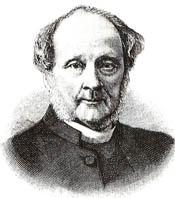|
Charles Wordsworth
Charles Wordsworth (22 August 1806 – 5 December 1892)[1] was Bishop of St Andrews, Dunkeld and Dunblane in Scotland. He was a classical scholar, and taught at public schools in England and Scotland. He was a rower, cricketer, and athlete and he instigated both the University cricket match in 1826 and the Oxford and Cambridge Boat Race in 1829. Early life and educationWordsworth was born in Lambeth, the son of the Rev. Christopher Wordsworth and a nephew of the poet William Wordsworth. His father was a divine and scholar. He was educated at Harrow where his friends included Charles Merivale and Richard Chenevix Trench. He was in the Harrow cricket eleven for the first regular matches with Eton (1822) and Winchester (1825),[2] He then went to Christ Church, Oxford where he won the Chancellor's Latin verse at Oxford in 1827, and the Latin essay in 1831, and took a first-class in classics. Through his continued contact with Merivale at Cambridge University, he is credited with bringing about the first Oxford and Cambridge match in 1827,[3] in which he captained Oxford and took seven wickets. Again with Merivale and his Cambridge contacts he instigated the first university boat race in 1829.[4] He played cricket in the Varsity match in 1829 and rowed in the winning Oxford crew in the Boat Race. In 1869 Wordsworth responded to John Morgan, who was investigating the health effects of rowing.[5]
Teaching careerFrom 1830 to 1833 Wordsworth was teaching and had as pupils a number of men, including William Gladstone and Cardinal Manning. He then travelled abroad during 1833–1834, and after a year as tutor at Christ Church (1834–1835) was appointed second master at Winchester College. He had previously taken holy orders, though he only became priest in 1840, and he had a strong religious influence with the boys.[3] In 1839 he brought out his Greek Grammar, which had a great success. In 1846, however, he resigned; and then accepted the wardenship of Trinity College, Glenalmond, the new Scottish Episcopal public school and divinity college, where he remained from 1847 to 1854, having great educational success in all respects; though his views on Scottish Church questions brought him into opposition at some important points to Gladstone.[3] Ecclesiastical careerIn 1852 Wordsworth was elected Bishop of St Andrews, Dunkeld and Dunblane,[6] and was consecrated in Aberdeen early next year. He was a strong supporter of the establishment, but conciliatory towards the Free churches, and this brought him into a good deal of controversy. He was a voluminous writer, and was one of the company of revisers of the New Testament (1870–1881), among whom he displayed a conservative tendency.[3] In 1864 his book On Shakspeare's Knowledge and Use of the Bible was published in London.[7] In continuing his letter to Morgan,[5] Wordsworth described his activities in 1869.
Later life Wordsworth died in St Andrews and is buried in the Eastern Cemetery against the north wall (which backs onto the cathedral grounds). FamilyWordsworth was twice married, first in 1835 to Charlotte Day (d. 1839), and secondly in 1846 to Katherine Mary Barter (d. 1897). He had thirteen children altogether.[3] He was the older brother of Christopher Wordsworth, Bishop of Lincoln. See his Annals of my Early Life (1891), and Annals of My Life, edited by W Earl Hodgson (1893); also The Episcopate of Charles Wordsworth, by his nephew John Wordsworth, Bishop of Salisbury (1899).[3] See alsoNotes
ReferencesWikimedia Commons has media related to Charles Wordsworth.
|
||||||||||||||||||||||||||||||||||||||||||||||
Portal di Ensiklopedia Dunia
